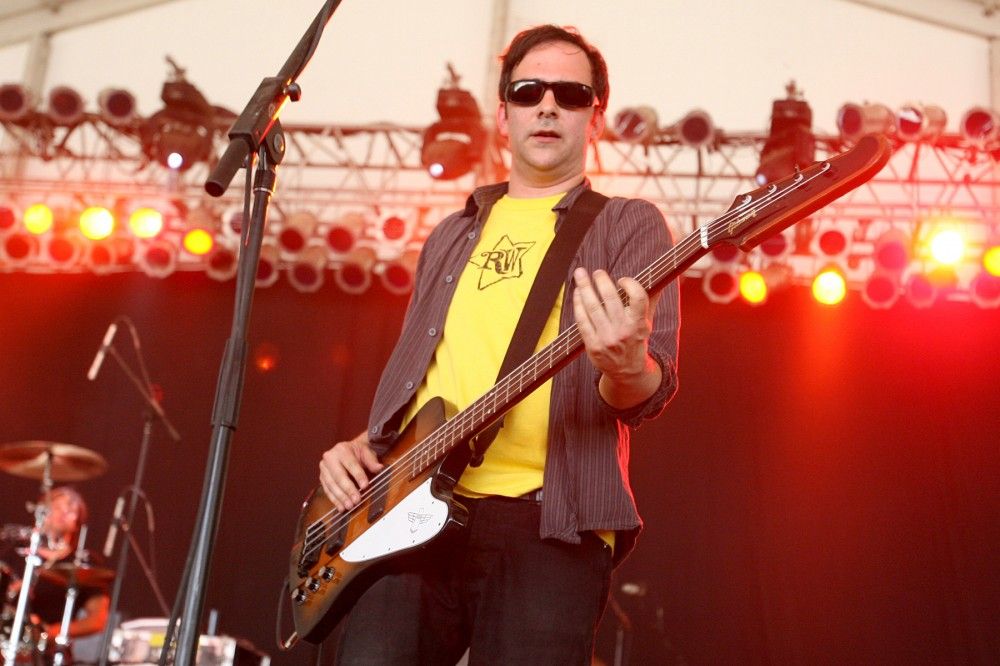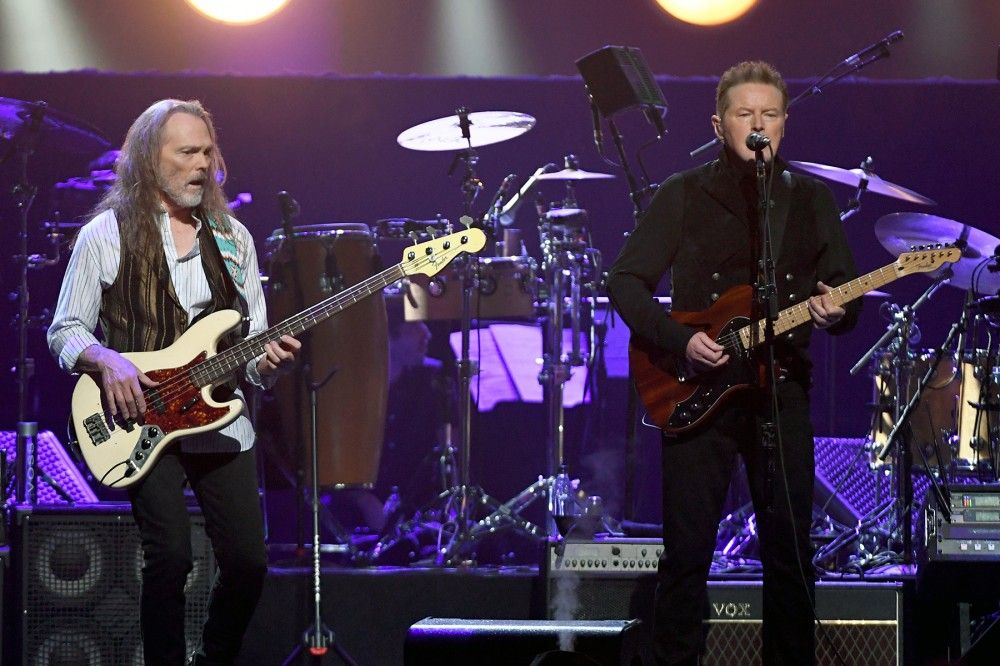
Fountains of Wayne's Adam Schlesinger: 20 Essential Songs
The news that ’s Adam Schlesinger has died at age 52 due to complications related to COVID-19 comes as a painful shock to fans of his hilarious, heartfelt, utterly one-of-a-kind style of songwriting. Working alongside Fountains of Wayne co-founder Chris Collingwood, and on his own in assorted side projects and TV and movie gigs, Schlesinger built up an unparalleled catalog of character studies of dreamers, lovers, and total idiots, mostly set in his native New Jersey and the surrounding areas. (“One of the great things about putting New Jersey towns in your songs is that there are so many with hilarious names that are fun to sing,” Schlesinger observed in 2005.)
Here at Rolling Stone, we’re mourning this tragic loss. Here are 20 reasons why we loved Schlesinger, drawn from the many songs he wrote, sang, produced, or performed on. (All songs are by Fountains of Wayne unless otherwise noted.)
“Sick Day” (1996)
A highlight from the first Fountains of Wayne album, “Sick Day” is a beautifully melancholic ode to a Jersey girl taking the PATH train into Manhattan to fake her way through another day of temp-job purgatory — “making the scene with her coffee and cream.” It’s simply the greatest song ever written about that sweet, slight moment of post-college, pre-career stasis, when nothing seems necessary, everything seems totally attainable yet weirdly beneath you, and even the dullest 9-to-5 distractions come haloed in “hey, whatever” possibility. Every detail is perfect, from the busted copy machine to the wannabe worker bee in the next cube. Considering how far we’ve fallen since the easeful, bountiful days of 1996, it’s almost hard to listen to, and now the line “lead us not into Penn Station” comes with a new gut-punch of bleak irony. J.D.
The Wonders, “That Thing You Do!” (1996)
It’s the hardest conceivable songwriting assignment: “Write a hit, now.” And not only that: “Write a hit that believably could take a band from local talent shows to touring nationwide, and, oh, yeah, write it in the precise idiom of an American garage band in the year 1964, and make it good enough that you can actually imagine it on the radio next to the Beatles.” That’s what Schlesinger pulled off with the stellar title track to Tom Hanks’ beloved movie, and he did it so well that it feels like he incepted the song into actual pop history. B.H.
Ivy, “I’ve Got a Feeling” (1997)
In the mid-Nineties, as Fountains of Wayne were getting going, Schlesinger formed the excellent band Ivy, with Andy Chase and French singer Dominique Durand. Their lavish, cosmopolitan sound placed them at the front of indie-pop style alongside sophisticates like Stereolab, Luna, Black Box Recorder, and St. Etienne, with Durand’s languid Parisian accent giving Schlesinger and Chase’s shimmering songs an enble air of continental refinement. They really hit it out of the park on 1997’s Apartment Life, mixing pristine guitar beauty and sweet, elegant malaise. “I’ve Got a Feeling” was too subtle for alt-rock radio in 1997, yet it remains ideal for any cocktail hour it happens to glide across. J.D.
“Utopia Parkway” (1999)
Three years after landing an alt-rock hit with the Collingwood-penned “Radiation Vibe,” Fountains of Wayne returned with a concept album about dead-end suburban ennui that rivals the best of the Kinks. The title track, named after a real street in Queens with a name too good not to steal, sums up the major themes. It’s sung by a guy in a cover band whose big break is always around the next outer-borough block, dreaming his life away to the kind of bittersweet melody he’d never be talented enough to write in real life. Schlesinger gives this aimless bro’s story real heart, making you root for him to win even though you know he never will. Atlantic Records promptly dropped the band after Utopia Parkway, which just proves his point. S.V.L.
“Red Dragon Tattoo” (1999)
There are Fountains of Wayne songs that rock harder (“Little Red Light,” to name one), but the band may not have recorded a more propulsive track than this Utopia Parkway highlight about a dude who takes the N train out to Coney Island in a desperate attempt to impress a girl who doesn’t know he exists. (“Will you stop pretending I’ve never been born?/Now I look a little more like that guy from Korn?”) Like most of their tales of the lovelorn, things don’t seem destined to end well for our hero — he concludes the song by again asking, “I’m fit to be dyed, am I fit to have you?” — but it’s an absolute jam for the listener. A.S.
“It Must Be Summer” (1999)
A most excellent power-pop bummer hidden at the very end of the second Fountains album, “It Must Be Summer” is the kind of song that would have guaranteed them a spot in the cult-classic canon even if they’d never scored another hit. The long-suffering narrator is hung up on someone who’s already long gone — this guy hates the summer, because it only means more daylight hours to reflect on how much his life sucks right now. He tries calling her sister on the Jersey Shore and her mom out on Long Island Sound, but neither one is much help. The storyline is right out of the Beatles circa “No Reply” and “You Won’t See Me”; the lead guitar and backing harmonies nick the Byrds from the same era; the punk-ish sulk of the verses could almost be Green Day. But none of those bands would ever have written about this specific Tri-State loser, lamenting his lameness in perfect pop couplets forever. S.V.L.
“Stacy’s Mom” (2003)
There was nothing really wrong with Stacy. She wore Van Halen T-shirts, rocked heart-shaped sunglasses, and liked to hang around by the po-oo-ol. Except of course, her mom was much hotter. Fountains of Wayne released two albums before 2003’s Welcome Interstate Managers, but it was this guitar-crunch anthem — where they shamelessly ripped off the Cars’ “My Best Friend’s Girl” and warped it into a twisted teenage fantasy — that skyrocketed the band into the mainstream. The iconic video stars model Rachel Hunter as the mom who picks Stacy up from school in a red convertible as a herd of drooling dudes stand around gawking. Stacy could have chosen the Ric Ocasek lookalike, but instead she goes with Mr. Wonderful, a kid who mows her lawn while her mother gets a massage he can’t stop staring at. He’s convinced he has a shot at replacing her deadbeat husband: “Since your dad walked out, your mom could use a guy like me!” All these years later, “Stacy’s Mom” remains the band’s most popular song, and wherever Stacy is now, we just hope she’s found a better partner. A.M.
“Hackensack” (2003)
This tale of a deluded Jersey nobody still pining after a high-school classmate who happened to become famous is so poignant you can feel it in the base of your spine, while still finding room for the line “I saw you talkin’/To Christopher Walken/On my TV screen.” It’s one of the best of the many wistful slice-of-life tales on Welcome Interstate Managers. (It somehow feels like part of the song’s punchline that Katy Perry mysteriously recorded a weirdly faithful cover of it when she did the revived MTV Unplugged in 2009.) B.H.
“Bright Future in Sales” (2003)
Combining comedy and pathos is hard in any medium, but doing it in a catchy three-minute pop song is nearly impossible. Boasting the classic opening line “Sleeping on a planter at the Port Authority/Waiting for my bus to come,” “Bright Future in Sales” is another killer Interstate Managers track, this time about a yuppie who doesn’t seem to realize he’s well on the way to alcoholism. B.H.
“Fire Island” (2003)
“Usually, a rule of thumb is if one of our songs has a New Jersey reference, or is about high school, that’s one of Adam’s,” Chris Collingwood once said to fans trying to delineate between Fountain of Wayne’s two principal songwriters. Welcome Interstate Managers’ “Fire Island” falls into the latter category, a nostalgic piano ballad about a young teenager in suburbia — freshly aged out of needing a babysitter — who plans on throwing a party the moment his parents go on their weekend trip to Fire Island. Like on many of his “high school” songs, Schlesinger’s lyrics find the sweet spot between adolescence and adulthood: The first verse warns of underage drinking, reckless driving, and skinny-dipping, while the more innocuous second verse dreams of playing music too loud and “Jumping on the couch/’Til the feathers all come out.” D.K.
“Maureen” (2005)
One of the kickiest pleasures in Fountains of Wayne’s catalog, this supercharged power-pop tune zips along at a breakneck pace that amplifies the romantic anxiety at its heart. A friend-zoned narrator keeps hanging out with his crush, even though she keeps spilling the details of her affairs with other guys — “the graphic imagery that you insist on feeding me,” as he puts it. He’s so smitten, it seems, that he can’t say her name without stuttering. So he turns it into a killer hook: “M-M-M-M-M-Maureen!” C.H.
“Yolanda Hayes” (2007)
Schlesinger turns his Beatles worship up to 11 on this song from 2007’s often-overlooked Traffic and Weather, pulling in “Getting Better” guitars and one of his finest imitation-McCartney melodies for the ballad of a hopeless crush on a clerk at the local DMV. (“She’s lookin’ all right/Despite the bright fluorescent lights/And I wonder what she’s like when she gets home at night…”) As with much of the band’s best work in the 2000s, it sounds almost like Schlesinger bet someone he could write a great song set in the most drab, ordinary circumstance possible. This time, the story has a happy ending — the guy gets to the front of the line, and Yolanda smiles, or he thinks she does. You could do worse than to hear this song’s golden chorus in your head the next time you go to renew your license. S.V.L.
“I-95” (2007)
Fountains of Wayne were great at writing about regular people battling life’s mundanities, and it doesn’t get much more mundane than a nine-hour drive down an East Coast interstate. Along the way, our hero encounters a numbing array of sights and sounds, enumerated with the kind of pop-cultural specificity this band values: Rest-stop shops selling Barney DVDs and “Virginia is For Lovers” tees, an old guy driving a van, a “kick drum mixed with static” from a fading radio station. Halfway through, we find out why he puts up with all of it: He’s on his way to see his beloved, and he’ll gladly make the trip again and again if he needs to. The result is a slow-mo ballad full of literary detail and Seventies-AM-radio fairy dust — and one of the sweetest love songs in all of alt-rock. C.H.
Music and Lyrics, “Way Back Into Love” (2007)
Like the title track from That Thing You Do!, this ballad has to hold up under repeated performances within the compact running time of the Hugh Grant–Drew Barrymore rom-com Music and Lyrics, where he plays the washed-up half of a Wham!-esque Eighties duo, while she’s his unlikely collaborator on a new song for a contemporary pop star. But “Way Back Into Love” has the tougher burden to shoulder on those repeat plays. It has to work in many iterations, including Grant and Barrymore’s embryonic demo recording and the pop star’s Indian-influenced “steamy and sticky” reinterpretation. And as the ultimate product of a story about the craft of songwriting, it has to feel worthy of the time spent discussing it, and of both halves of the movie’s title. Thankfully, it does. Passages like “I’ve been hiding all my hopes and dreams away/Just in case I ever need ’em again someday/I’ve been setting aside time/To clear a little space in the corners of my mind” feel just broad enough to be part of a Top 40 hit, but also wistful and smart enough to justify the talk of Barrymore’s unpolished gifts. A.S.
Willie Nelson and Stephen Colbert, “Little Dealer Boy” (2008)
Before Willie Nelson was recording stoner Christmas jingles with Kacey Musgraves, the country singer delivered “Little Dealer Boy,” co-written by Schlesinger and comedy writer David Javerbaum, alongside Stephen Colbert. The yuletide duet was one of eight quirky seasonal tracks the songwriters penned for the then-Colbert Report host’s 2008 special A Colbert Christmas: The Greatest Gift of All. Schlesinger and Javerbaum (who operates the popular @TheTweetOfGod account on Twitter) also collaborated on a musical based on John Waters’ Cry-Baby and, later, Neil Patrick Harris’ Emmy-winning Tony Awards opener “Not Just for Gays Anymore.” D.K.
Tinted Windows, “Messing With My Head” (2009)
“The Fountains of Wayne are great exponents of] the perfect pop song, when times were simpler and music was good,” James Iha said in the late Nineties, when Smashing Pumpkins selected the band as openers. Schlesinger and Iha’s connection goes back even further than that, to 1995, when they co-founded Scratchie Records with D’arcy Wretzky. Almost 15 years later, Schlesinger and Iha reunited to form the unlikely supergroup Tinted Windows with former Cheap Trick drummer Bun E. Carlos and, on lead vocals, Hanson’s Taylor Hanson. Tinted Windows released one self-titled studio album of mostly Schlesinger-penned tracks. While the album wasn’t “perfect,” it packed plenty of the pop hooks that drew Iha to Schlesinger’s music in the first place, with “Messing With My Head” a highlight of the short-lived supergroup. D.K.
“The Summer Place” (2011)
The big, sunny blast of beachy, beardly acoustic strumming that opens the first track on 2011’s A Sky Full of Holes has serious overtones of America’s “Sister Golden Hair,” and the Fountains wear that musk of retro-Seventies majesty very well, effortlessly moving on to a bit of peppy, warmly delivered social critique that’s a little like a good-humored version of This Year’s Model-era Elvis Costello. The lyrics tell the story of a woman coming up to the Fire Island/Cape Cod-type vacation house her family has been going to since she was a kid, with images flashing from her bored, depressed middle-aged perspective to memories of spoiled misadventures from her equally bored, though perhaps somewhat less depressed, Seventies childhood (the time she got busted shoplifting, the time she went to the hospital after taking mushrooms, etc.). “At the summer place, the injuries fade/But the memories last a lifetime,” the band sings, reminding us that Seagram’s and sunshine are at best temporary tranquilizers for a life that keeps letting you down. What sets the song apart is that there isn’t a hint of the mean-spirited snark you might get from a less empathetic band writing about wayward rich people who may or may not deserve a ton of sympathy — let alone a song this unforgettably cute and catchy. J.D.
“Richie and Ruben” (2011)
Sky Full of Holes is packed with the bittersweet short stories that were Schlesinger’s stock in trade. (“Action Hero,” in which a bored middle-aged dad fantasizes about a more exciting life, doubles as a metaphor for Schlesinger’s side career imitating more commercial forms of music.) “Richie and Ruben” is the wryly comic tale of two hustling entrepreneurs with way more moxie than good sense. (Of their short-lived boutique, Debris, we’re told the wares included “Eleven hundred bucks for a ripped-up shirt/That came pre-stained with bleach and black dirt/Seemed just a little bit/Too steep to me.”) The tales of their ineptitude are so efficiently vivid, it may take a few listens to notice the more important punchline: that the whole thing is being told not by an omniscient, dispassionate narrator, but by a friend who got suckered into investing in these terrible ideas again and again, because Richie and Ruben are at least as charming as the song itself. A.S.
The Monkees, “Our Own World” (2016)
Schlesinger produced the first Monkees album in 20 years, in which the band sang tunes written by fans like Ben Gibbard of Death Cab For Cutie, Oasis’ Noel Gallagher, and Weezer’s Rivers Cuomo, among others. The result was a wonderful collection of tunes that showcased all the Monkees’ beautifully aged voices. Schlesinger also contributed the standout, “Our Own World” — a blast of bright Sixties rapture with a lead vocal from Mickey Dolenz that could’ve been a hit back when the Monkees made their original run. J.D.
Crazy Ex-Girlfriend, “The Math of Love Triangles” (2016)
Across four seasons of the CW’s Crazy Ex-Girlfriend, Schlesinger, Jack Dolgen, and the show’s co-creator and star Rachel Bloom wrote close to 150 original songs in a staggering array of genres and styles, from Broadway to rap to New Jack Swing, all of them catchy, funny, and wholly convincing facsimiles of the genuine article. (“Ping Pong Girl” sounds like the kind of pop-punk tune Schlesinger would have written for the Click Five alongside “Just the Girl,” while “The Very First Penis I Saw” is the best song Abba never performed, but should have.) “The Math of Love Triangles” is on the sillier end of what the series could do. (For a mix of spoof parody and pathos in equal measure, try “A Diagnosis,” “You Stupid Bitch,” or “It Was a Shit Show.”) But it’s also a hilarious, note-perfect riff on Marilyn Monroe in Gentlemen Prefer Blondes, with Bloom as a breathy air-head trying to use math metaphors to solve a romantic dilemma, much to the dismay of her would-be geometry teachers: “This triangle’s scalene”/“That’s astute”/“So I need to decide which man’s more acute!” A.S.



